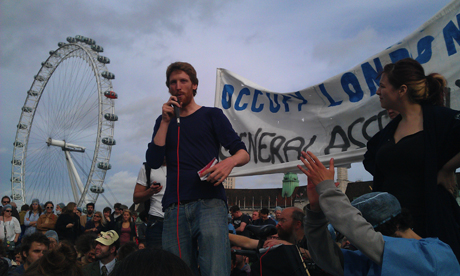You Can’t Evict an Idea – review

Tim Gee with Occupy activists on Westminster Bridge
In the mid-1990s pundits would often blithely say we were witnessing the end of history as passionate ideological battles seemed to have been neutered by the mollifying force of neoliberalism.
There was an air of ‘How I learned to stop worrying and love high finance’ about that booming (if boring) era, and a complacency that held sway until the financial crash in 2008, when it turned out history had not ended.
Up sprang Occupy with slogans about the disenfranchisement of ‘the 99 per cent’, drawing attention to the co-opting and corruption of the democratic system by powerful elites and certain corporations that further undermine democracy by avoiding tax.
All good, but people wondered what Occupy hoped to do about this. Tim Gee provides some answers and dispels some myths in this measured and optimistic book. For example, he says it is a matter of debate whether the movement is anti-capitalist.
Not that he would claim to speak for Occupy, which is of course pluralistic and leaderless.
To recap, a long running protest camp was established next to St Paul’s Cathedral by activists under the banner of Occupy after they were moved on from their initial target, Paternoster Square, home to the London Stock Exchange.
A camp was also set up in Leyton Marshes in protest at the co-opting of public land for use for a private Olympics facility, and in Shoreditch a ‘Bank of Ideas’ was set up in a building owned by a financial institution.
By far the least inspiring answer to the question of Occupy’s identity is that refrain about it being ‘a space to discuss’.
But Gee does pin down powerful definitions and points to concrete achievements and fresh thinking generated by young activists, for example fundraising to buy cut price debt and then cancel it.
He writes: “I have been asked, ‘but what do you propose as an alternative to what we have?’ The answer I give is the same that has been given by movements throughout history. The answer is democracy.”
To Gee, what we have is only nominally democratic.
The system is so skewed against the interests of the majority and in favour of the elite. So Occupy can be seen as a movement in favour of true democracy.
As for the other question, whether it has made any difference, it’s too early to say. Gee reckons that depends on how activists build on their consciousness-raising and organising – in other words, history will tell.
You Can’t Evict an Idea: What Can We Learn From Occupy
by Tim Gee is published by Housmans, ISBN: 978 0 85283 274 5, RRP: £3.
